Motorcycle Test Debacle – Over There – Over Here?
26th March 2010
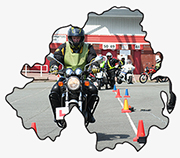 Motorcycle organisations in the UK including the Motorcycle Industry, have responded to a report by the Parliamentary Transport Select Committee (TSC) on the new European motorcycle test. The report is the result of a short enquiry with submitted written evidence and an oral evidence session which took place in October 2009 in the House of Commons.
Motorcycle organisations in the UK including the Motorcycle Industry, have responded to a report by the Parliamentary Transport Select Committee (TSC) on the new European motorcycle test. The report is the result of a short enquiry with submitted written evidence and an oral evidence session which took place in October 2009 in the House of Commons.
The “new” European test was introduced in Northern Ireland in December 2008 and in April 2009 in the rest of the UK . Its aim is to improve road safety. The test employs two practical elements: one consists of technical exercises off-road, designed to assess the rider’s ability to control the machine safely (including a swerve and brake manoeuvre). These are tested at designated Multi Purpose Test Centres (MPTCs). The other element is a road-based test of traffic handling skills on the public highway.
Launching the report, the Transport Select Committee Chair, Louise Ellman MP said, “Many candidates and trainers now have to travel too far for their motorcycle test. This adds to the cost, and in some cases, exposes candidates to fast and dangerous roads on the way to a test site – before they have even taken their test.”
The TSC Committee also said that, “The committee accepts the industry’s argument that Government has ‘gilded the lily’ by adding more manoeuvres to the test than is strictly required by the Brussels Directive, but believes the Government was right to do so.”
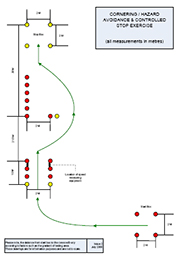 Riders groups and the motorcycle industry have commented that, “By combining braking and swerving the DSA (Driving Standards Agency GB)* have exceeded the EU Directive’s requirements and made it a more difficult and hazardous manoeuvre, so much so that several learners have crashed trying to complete the sequence.” – “That there are too few test centres and many test candidates are now required to travel long distances to take the test.”- “The new test is gaining a reputation of being dangerous and this needs correcting before lasting damage is done to testing and training.”
Riders groups and the motorcycle industry have commented that, “By combining braking and swerving the DSA (Driving Standards Agency GB)* have exceeded the EU Directive’s requirements and made it a more difficult and hazardous manoeuvre, so much so that several learners have crashed trying to complete the sequence.” – “That there are too few test centres and many test candidates are now required to travel long distances to take the test.”- “The new test is gaining a reputation of being dangerous and this needs correcting before lasting damage is done to testing and training.”
The report seems to have vindicated rider representatives and the motorcycle industries position in – England – Scotland – Wales – but what about over here in Northern Ireland?
There does not seem to be any cries of indignation from any quarter regarding the test since its early introduction in Northern Ireland.
Comments from an English trainer: “From the info I have about the NI version of our test it looks a bit like a simplified version of ours, the main problems with us is the distances we have to travel as we are not really used to having to go more than 8 or 9 miles to get to a test centre, also as this winter has proved we seem to have quite prolific weather micro systems, about a week ago it was very fine and clear so off me and a trainee went to our mod 1 test centre, guess what, when we got there it was “effin” snowing, the distance was only 16 miles.
I think that the reason both NI and Ireland don’t have the attitude that we have, is probably down to the more relaxed way and attitude to life which to me seems to prevail. Over here as you know we tend to have a “want it now and want it easy” frenetic lifestyle, but in the main the problem for us is the distances and lack of test availability which is a major problem. I also think that in NI you have always had to travel to a test centre rather than rely on one in the same town as you live”.
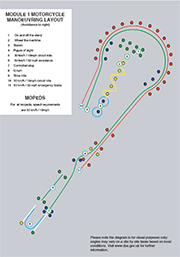 Right To Ride’s, Trevor Baird says, “In whatever form, the test is here to stay. We will have to wait to see what changes if any, are made in GB and whether there will be any changes for Northern Ireland, if in fact any are required”
Right To Ride’s, Trevor Baird says, “In whatever form, the test is here to stay. We will have to wait to see what changes if any, are made in GB and whether there will be any changes for Northern Ireland, if in fact any are required”
We may be somewhat isolated from these issues. When legislation from the rest of the UK and Europe arrives on our shores, they are dealt with by the Assembly and their implementation by government departments that hold legislation up to the light, give a good looking at and then modify it for use here”
Whatever the outcome, we have more of our own issues to contend with e.g. the proposed introduction of CBT (Compulsory Basic Training); a consultation regarding the introduction of the Third European Driving Licence and a Road Safety Strategy all with a Northern Ireland flavour and perhaps with a hint of madness contained in the proposals and consultations.
* The DSA (Driving Standards Agency) is the licensing agency in England, Scotland and Wales in Northern Ireland it is the DVA (Driver and Vehicle Agency).
No Real Outcry Yet!
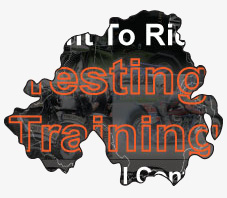 Comments from a Northern Ireland Trainer: Probably one of the main reasons there seems to be no real outcry is that we only have to do the test on 125cc bikes so they are easier to swerve and stop in the distance available so not so much risk on the manoeuvre that contains the swerve.
Comments from a Northern Ireland Trainer: Probably one of the main reasons there seems to be no real outcry is that we only have to do the test on 125cc bikes so they are easier to swerve and stop in the distance available so not so much risk on the manoeuvre that contains the swerve.
In fact there is no reason to brake before going into the swerve, braking only being done on a straight line towards the end box. (If done correctly).
If I had to teach the same manoeuvres on a 500cc bike then I would have more work to do and it would be more dangerous.
However travelling the distance is a problem, particularly because dates for tests aren’t put on that often.
So in Ballymena I have seen trainers from Coleraine or even Newtownards coming down with trainees for tests. In both cases they arrive with the bike in a van or on a trailer.
Usefull Links
Parliamentary Transport Select Committee (TSC) on the new European motorcycle test Click Here ![]()
Parliamentary Transport Select Committee (TSC) on the new European motorcycle test Full Report pdf 1.86mb Click Here ![]()
DVA – Motorcycle Manoeuvres Test Content for Northern Ireland Click Here ![]()
Right To Ride – Northern Ireland Road Safety Consultation Click Here ![]()
DOE – Northern Ireland Third European Driving Licence Consultation Click Here ![]()
What Sammy Said!
 Think of a Northern Ireland politician and then think of motorcycles and you will probably arrive in the thought process with the name Sammy Wilson or perhaps Ian Paisley Junior.
Think of a Northern Ireland politician and then think of motorcycles and you will probably arrive in the thought process with the name Sammy Wilson or perhaps Ian Paisley Junior.
However in the case of the Parliamentary Transport Select Committee (TSC) on the new European motorcycle test, which took place in October 2009 in the House of Commons, it was Sammy Wilson as an MP and member of the Associate Parliamentary Group for Motorcycling who attended the committee meeting.
The groups purpose is to safeguard motorcycling interests by monitoring legislation for matters affecting motorcycling in both the UK and Europe and taking remedial action where necessary; to represent motorcycling issues to fellow parliamentarians; to organise social events; to foster the good image of motorcycling and, by example, to encourage others to take up motorcycling.
Below are some of the pertinent questions asked by Sammy – the full report is available Click Here pdf 1.86mb
Q11 Sammy Wilson: Can I just ask about the intensity of the land use and the fact that large sites are required, and having gone to one of the test centres in Northern Ireland and tried the manoeuvres – and I have been driving motorcycles since I was 17—I can confirm what you are saying about the inadequacy of the distance you have (and I do not think I am too heavy) trying to get a 125cc up to the speed that is required, et cetera, you are pushing it, and the experienced rider might be able to do it but an inexperienced person might be put off by it. Have you found the same, as we have in Northern Ireland, that when it actually comes to training riders that because of the amount of land that is needed that it really is quite difficult for training schools to find somewhere where it is still economical for them to train riders and how have you got round that problem or indeed has it been got round?
Q13 Sammy Wilson: Can I ask one other question then related to that. Are there any parts of the current manoeuvres that you believe could be taken out that would resolve some of those issues insofar as you would not require these large areas for testing and for training riders and therefore make that training more accessible, as you say, in rural areas or in parts of Scotland and Wales?
Q52 Sammy Wilson: If I can just follow on from that, it may be regarded as less gold-plated if you compare it with a country where you say the standards are tougher, though there is some dispute about that but, generally speaking, across the European Union, have we gold-plated the test? To get a comparison, tests that we need, and, more importantly, both parts of the test on the same day at a test centre that is not too far to travel to, people are being forced to come back twice, which is increasing the cost to them even more.
Q53 Sammy Wilson: The Irish Republic certainly carry on most of this on road and do not actually carry out quite the same range of manoeuvres or at the same speed.
Q54 Sammy Wilson: The evidence we received earlier on was that the more you concentrate on off road testing, the less you actually subject new riders to the real conditions on road and therefore there is bound to be – whether it can be quantified or not is another matter – some implication in terms of road safety and in terms of how well prepared riders are for going into real-life situations once they go out on the road. Do you have any view on the merits of off road as opposed to on-road testing, and indeed from your own experience whether it is likely to lead to the kinds of outcomes which were suggested by the earlier evidence?
Sammy Wilson: Really, it is not a minimum interpretation that we have. Is it not, as some people have said, that we have gold-plated the arrangements?
Sammy Wilson: First of all, if it is divided as it is at present, more time is going to be spent, by definition, because half of the test, an important part of the test, the part which enables you to move to the second module, is off road. It is a series of predetermined manoeuvres which you can train people for and perhaps exclusively concentrate on that. Some manoeuvres do not coincide with real life. For example, when you swerve to avoid something, you do not automatically stop afterwards, which is part of the swerve requirement. We could go through some of the other ones. So first of all, they are not totally related to what a rider would face on the road but, secondly, the emphasis is on predetermined manoeuvres is likely to lead to people being trained to do certain manoeuvres rather than to become aware of the issues they will be faced with on the road.


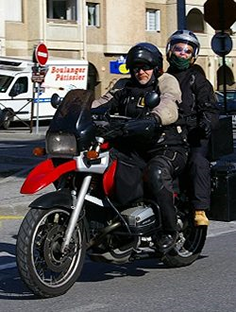
Speak Your Mind